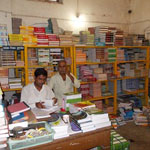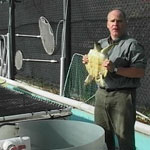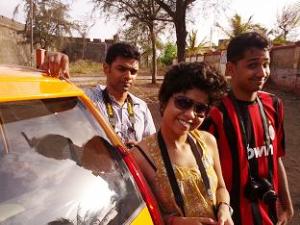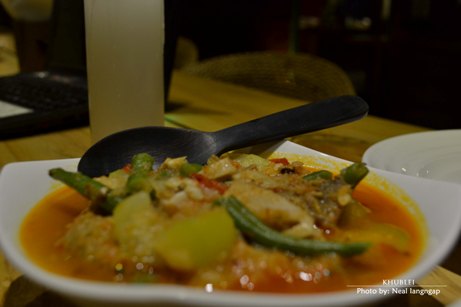"Our origins date back to before 1942, but we established ourselves in the present form and location in that year. Our founder Bichitranarayan Dutta Baruah (BNDB) was an advocate who left his profession and established Lawyer's Book Stall - hence the name which basically means, a book stall belonging to a Lawyer (note the apostrophe after the R). We do have a special section for law books, but we are not a shop exclusively for Lawyers," he clarifies. After Bichitranarayan, his son Khagendranarayan Dutta Baruah (KNDB) carried on the business from around 1973 till 2001. From 2001 till 2003 it was KNDB's wife Reena Dutta Baruah who ran the house.
The book stall started off as a medium-sized business, dealing even with stationary items, besides books, in the beginning. Almost as a natural corollary, publishing happened simultaneously with the retail business. Since the beginning, Lawyer's has focussed on archiving and publishing old and out of print works and has always encouraged new writers. "Most of the legendary writers of Assam, many of whom are no more today, were struggling in their initial days and we can humbly state that Lawyer's provided them with the platform to launch themselves. KNDB was known to have a passion for encouraging new writers and at one point was publishing around a hundred titles annually. We have also placed many publications from Assam in different world libraries through our network," adds Baruah.
Almost as a challenge, LBS Publications, India has taken the publication of books from and on Northeast India as their mandate. "Even if we end up investing in a lot of slow moving stock, we have to concentrate on these since this is our USP. As a business, of course it is not loss making, but a lot of marketing is definitely required," says Baruah. However, a devastating fire gutted their premises in September 2004 which was a major setback to many of their plans.
Books from Northeast India are in demand. However, Baruah feels that a number of publishers and publications that produce sub-standard books have also entered the market purely for the library markets. "I am talking about the highly priced, hard bound books. Besides Assam, many of these publishers are based out of Delhi and for them content creation is just a matter of copy, paste and rearrange. Our market is also not as organised and clean as before. Many clients that come in the form of libraries etc. encourage the purchase of these books for reasons known only to them. Such publications are somewhere denting the sales of genuine publications," he says.
However, this young entrepreneur feels that looking at the number of publishers that have sprung out of nowhere in the past few years, book publishing must be a profitable venture. "But if you look at them more closely, you will see that most such publishers invest primarily in text/reference and guide books," he adds.
He charts out certain problems facing the book publishing business as a whole in the region. However, these issues are often separate for literary/general publications and textbooks. Firstly, easy entry into the trade has resulted in the creation of many cowboy publishers who do not work in an organised manner. This has flooded the market with sub-standard books, pirated editions etc. This holds true for both general and text publications. Secondly, there is no strong constitution that binds the publishers of Assam (and perhaps the rest of India as well) together. Heavy discounts resulting in wafer thin margins are being offered by publishers without any trade consultation in order to boost sales. Such marketing tactics might be feasible for small traders, but for publishers like us, who have a relatively large establishment, these measures do not work.
"We work within a certain framework - we do not publish just for the heck of doing so, we also do not entertain all authors, even if they churn out 'best sellers' every year. We concentrate a lot of quality. This has resulted in the number of publications coming out of Lawyer's less annually now than it was say 15 years back," adds Baruah. However, demand for types of books by many institutional buyers are often dependent on discounts than quality.
Baruah agrees that there has been a spurt in the number of writers in the region. His publishing house has an editorial board who screen manuscripts, especially from new authors before accepting them.
There is a demand for books from Northeast India outside India but it is limited. "Demand is mostly restricted to pictorial books, travel guides etc. Our writers need to be translated, reviewed and marketed more vigorously and as mainstream writers, not just regional. But then we are pitching ourselves against the big publishing houses in the country," he adds.
The publishing house has published thousands of titles since inception. However, a few titles sell equally well today, as they did years back. These include Iyaruingam, Saurav Kumar Chaliha's writings, translation works by Khagendra Narayan Dutta Baruah and Abul Lais. Red River is their imprint (started in 2007) that only publishes coffee table and pictorial books. Their first coffee table publication was Tea-legend, life and livelihood of India by GP Baroowah followed by books on Nagaland, Bodoland, Nature Reserves.
He suggests certain ways to promote the rich literature of the region -- Translation into other languages and promote it as mainstream and not Northeastern, more participation by regional publishers in international book fairs and Internet retailing, reviewing and e-magazines.
He believes in catching them young. There are a lot of good content for books, but presentation is the concern. "We need to compete with the glossy, colourful foreign publications in front of the child - there is no way we can capture the attention of the child unless we improve the production and design of our books," he adds. However, children's books are one of their major focus areas and they have plans to add and improve more in this area. "We need support of forums, schools and parents to design further strategies to promote reading habits among them," he adds.
He feels that the culture of book reading is still alive to an extent. "But it is the job of us publishers and the authors to offer quality reading materials," he says. However, he feels that the culture of e-books is yet to creep into Assam. "In Assam, infrastructure is yet to develop, not just in terms of internet access, but even in terms of basic necessities like electricity for e-books to rise. I think we still have a lot of time for that," he adds.
As a publisher, however, he is ready to catch up with changing trends in the future. "Although, if some day, it will be sad if the beautiful well bound printed books become a thing of the past, we have to bear in mind that e-books will be cheaper to buy and produce and definitely healthier for the environment," he adds.
When he is not working, Baruah is into creative writing, natural history, wildlife conservation and environment, traveling and intermittent freelance writing. But does this young publisher see the death of books one day? He ruminates, "See, everything has to die one day, horse drawn carriages have made way for cars and ocean liners have been replaced by aircrafts. Death of printed (I would not say real, for it is the content that makes a book not its fabrication) would be dependent on how easy it will be in the future to recline against the couch and read. Computers are a 'lean forward' tool and printed books are 'lean back'. Tablet PCs have made some headway in making reading easy, but it still has got a long way to go - you can't fall asleep with a tablet in your hands."
" >
"Our origins date back to before 1942, but we established ourselves in the present form and location in that year. Our founder Bichitranarayan Dutta Baruah (BNDB) was an advocate who left his profession and established Lawyer's Book Stall - hence the name which basically means, a book stall belonging to a Lawyer (note the apostrophe after the R). We do have a special section for law books, but we are not a shop exclusively for Lawyers," he clarifies. After Bichitranarayan, his son Khagendranarayan Dutta Baruah (KNDB) carried on the business from around 1973 till 2001. From 2001 till 2003 it was KNDB's wife Reena Dutta Baruah who ran the house.
The book stall started off as a medium-sized business, dealing even with stationary items, besides books, in the beginning. Almost as a natural corollary, publishing happened simultaneously with the retail business. Since the beginning, Lawyer's has focussed on archiving  and publishing old and out of print works and has always encouraged new writers. "Most of the legendary writers of Assam, many of whom are no more today, were struggling in their initial days and we can humbly state that Lawyer's provided them with the platform to launch themselves. KNDB was known to have a passion for encouraging new writers and at one point was publishing around a hundred titles annually. We have also placed many publications from Assam in different world libraries through our network," adds Baruah.
and publishing old and out of print works and has always encouraged new writers. "Most of the legendary writers of Assam, many of whom are no more today, were struggling in their initial days and we can humbly state that Lawyer's provided them with the platform to launch themselves. KNDB was known to have a passion for encouraging new writers and at one point was publishing around a hundred titles annually. We have also placed many publications from Assam in different world libraries through our network," adds Baruah.
Almost as a challenge, LBS Publications, India has taken the publication of books from and on Northeast India as their mandate. "Even if we end up investing in a lot of slow moving stock, we have to concentrate on these since this is our USP. As a business, of course it is not loss making, but a lot of marketing is definitely required," says Baruah. However, a devastating fire gutted their premises in September 2004 which was a major setback to many of their plans.
Books from Northeast India are in demand. However, Baruah feels that a number of publishers and publications that produce sub-standard books have also entered the market purely for the library markets. "I am talking about the highly priced, hard bound books. Besides Assam, many of these publishers are based out of Delhi and for them content creation is just a matter of copy, paste and rearrange. Our market is also not as organised and clean as before. Many clients that come in the form of libraries etc. encourage the purchase of these books for reasons known only to them. Such publications are somewhere denting the sales of genuine publications," he says.
However, this young entrepreneur feels that looking at the number of publishers that have sprung out of nowhere in the past few years, book publishing must be a profitable venture. "But if you look at them more closely, you will see that most such publishers invest primarily in text/reference and guide books," he adds.
He charts out certain problems facing the book publishing business as a whole in the region. However, these issues are often separate for literary/general publications and textbooks. Firstly, easy entry into the trade has resulted in the creation of many cowboy publishers who do not work in an organised manner. This has flooded the market with sub-standard books, pirated editions etc. This holds true for both general and text publications. Secondly, there is no strong constitution that binds the publishers of Assam (and perhaps the rest of India as well) together. Heavy discounts resulting in wafer thin margins are being offered by publishers without any trade consultation in order to boost sales. Such marketing tactics might be feasible for small traders, but for publishers like us, who have a relatively large establishment, these measures do not work.
"We work within a certain framework - we do not publish just for the heck of doing so, we also do not entertain all authors, even if they churn out 'best sellers' every year. We concentrate a lot of quality. This has resulted in the number of publications coming out of Lawyer's less annually now than it was say 15 years back," adds Baruah. However, demand for types of books by many institutional buyers are often dependent on discounts than quality.
Baruah agrees that there has been a spurt in the number of writers in the region. His publishing house has an editorial board who screen manuscripts, especially from new authors before accepting them.
There is a demand for books from Northeast India outside India but it is limited. "Demand is mostly restricted to pictorial books, travel guides etc. Our writers need to be translated, reviewed and marketed more vigorously and as mainstream writers, not just regional. But then we are pitching ourselves against the big publishing houses in the country," he adds.
The publishing house has published thousands of titles since inception. However, a few titles sell equally well today, as they did years back. These include Iyaruingam, Saurav Kumar Chaliha's writings, translation works by Khagendra Narayan Dutta Baruah and Abul Lais. Red River is their imprint (started in 2007) that only publishes coffee table and pictorial books. Their first coffee table publication was Tea-legend, life and livelihood of India by GP Baroowah followed by books on Nagaland, Bodoland, Nature Reserves.
He suggests certain ways to promote the rich literature of the region -- Translation into other languages and promote it as mainstream and not Northeastern, more participation by regional publishers in international book fairs and Internet retailing, reviewing and e-magazines.
He believes in catching them young. There are a lot of good content for books, but presentation is the concern. "We need to compete with the glossy, colourful foreign publications in front of the child - there is no way we can capture the attention of the child unless we improve the production and design of our books," he adds. However, children's books are one of their major focus areas and they have plans to add and improve more in this area. "We need support of forums, schools and parents to design further strategies to promote reading habits among them," he adds.
He feels that the culture of book reading is still alive to an extent. "But it is the job of us publishers and the authors to offer quality reading materials," he says. However, he feels that the culture of e-books is yet to creep into Assam. "In Assam, infrastructure is yet to develop, not just in terms of internet access, but even in terms of basic necessities like electricity for e-books to rise. I think we still have a lot of time for that," he adds.
As a publisher, however, he is ready to catch up with changing trends in the future. "Although, if some day, it will be sad if the beautiful well bound printed books become a thing of the past, we have to bear in mind that e-books will be cheaper to buy and produce and definitely healthier for the environment," he adds.
When he is not working, Baruah is into creative writing, natural history, wildlife conservation and environment, traveling and intermittent freelance writing. But does this young publisher see the death of books one day? He ruminates, "See, everything has to die one day, horse drawn carriages have made way for cars and ocean liners have been replaced by aircrafts. Death of printed (I would not say real, for it is the content that makes a book not its fabrication) would be dependent on how easy it will be in the future to recline against the couch and read. Computers are a 'lean forward' tool and printed books are 'lean back'. Tablet PCs have made some headway in making reading easy, but it still has got a long way to go - you can't fall asleep with a tablet in your hands."







































